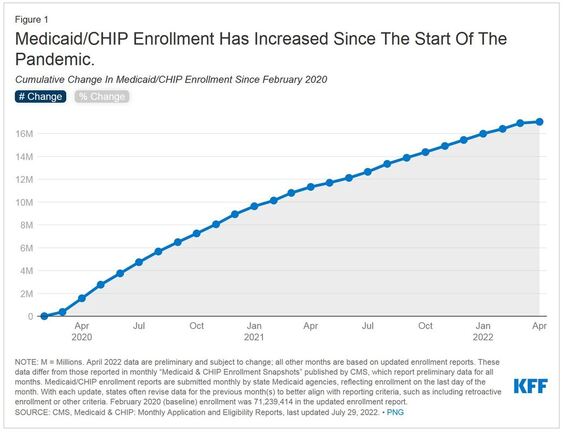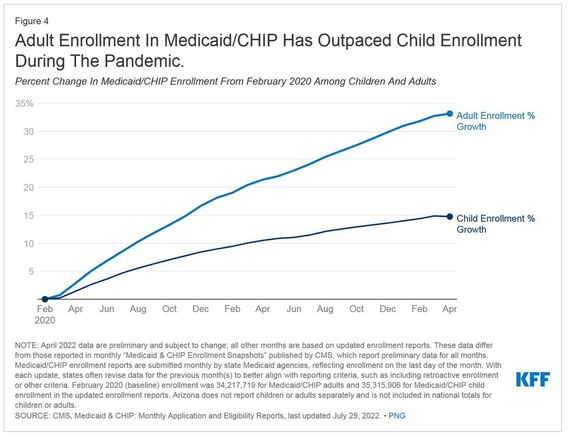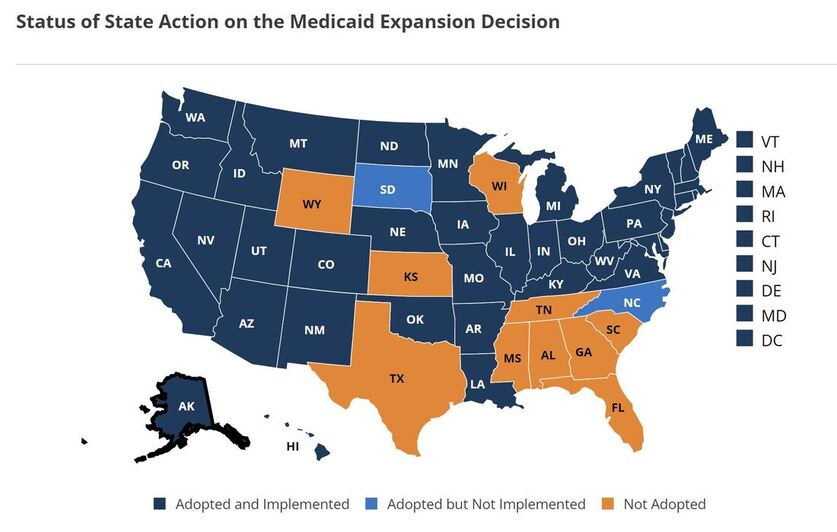What's on the Table for Medicaid?
The Role of Medicaid in Health Care
Learn more about the role and impact of Medicaid.
Medicaid & the Coronavirus-19 Pandemic
What's the latest with Medicaid?
"One-stop shop" on community-based services under Medicaid
CMS is offering a “one stop shop” with comprehensive information for state-level Medicaid agencies and stakeholders. This resource offers information about states’ plans to enhance, expand, and strengthen home- and community-based services across the country, using new Medicaid funding made available by the American Rescue Plan Act of 2021 (ARP).
Expanded mobile crisis services for Medicaid beneficiaries
CMS has awarded $15 million in planning grants to 20 states to support expanding community-based mobile crisis intervention services for Medicaid beneficiaries.
Medicaid Expansion
To date, 39 states (including DC) have adopted Medicaid expansion and 12 states have not adopted expansion.
Learn more about the status of expansion in each state.
In the ten years since the Patient Protection and Affordable Care Act (ACA) passed, over 400 studies have demonstrated the impact of expanding Medicaid. Read more about the effect of expansion on coverage, access to care, utilization, quality of care, health outcomes, provider capacity, affordability, and financial security.
Learn more about the status of expansion in each state.
In the ten years since the Patient Protection and Affordable Care Act (ACA) passed, over 400 studies have demonstrated the impact of expanding Medicaid. Read more about the effect of expansion on coverage, access to care, utilization, quality of care, health outcomes, provider capacity, affordability, and financial security.
Medicaid waivers
Under existing federal Medicaid law, states can improve their Medicaid programs using tools such as Section 1115 waivers to best meet their state's particular needs. Visit KFF’s Medicaid Waiver Tracker to monitor approved and pending waivers by state, including those with work requirements.
Medicaid and work requirements
Work requirement waivers generally require beneficiaries to verify their participation in certain activities, such as employment, job search, or job training programs, for a certain number of hours per week (or to verify an exemption), in order to receive or retain Medicaid coverage.
What do we know about Medicaid and employment?
What is the impact of work requirements on hospital finances, especially in rural areas?
What do we know about Medicaid and employment?
What is the impact of work requirements on hospital finances, especially in rural areas?
The role of Medicaid in responding to the opioid epidemic
Nearly four in ten non-elderly adults with opioid use disorder (OUD) are covered by Medicaid.
Learn more about Medicaid's role in facilitating access to OUD treatment.
Read about policy responses to the opioid epidemic.
Learn more about Medicaid's role in facilitating access to OUD treatment.
Read about policy responses to the opioid epidemic.
The bipartisan National Academy for State Health Policy notes that States will have numerous considerations about Medicaid and long-term care services, if Medicaid funding is reduced and/or expansion rolled back. |
Considerations for States about Medicaid |
1. The repeal of the ACA would result in millions of individuals losing Medicaid or CHIP coverage. The 39 States that expanded Medicaid will either need to pick up costs with all State dollars or shut down part of their Medicaid program. Specifically, they may have to: a) dis-enroll individuals from Medicaid; b) review and address contracts that need to be modified or terminated; c) collect, process, and pay providers of expansion beneficiaries; and/or d) make eligibility and enrollment system changes that will be dependent upon repeal language. Regarding the latter point, will States need to change eligibility methodology from MAGI? How much will it cost to dismantle the integration with current marketplaces?
2. With individuals losing Medicaid coverage, what would be the magnitude of the increase in uncompensated care costs? What would be the financial impact on providers in States that expanded Medicaid, such as rural hospitals and community health centers? What would be the impact on individuals’ ability to access care? 3. Would care coordination initiatives, such as Medicaid Health Homes, remain in place even if the ACA is repealed? States may no longer receive enhanced funding matches for these services, so there would be additional costs to States. |
Considerations for States about HCBS |
1. Repealing the ACA could remove State flexibility for implementing home- and community-based services (HCBS) as a Medicaid option in State Plans. Would States continue to have flexibility to promote HCBS in Medicaid? If so, through what authority?
2. Would there be an enhanced federal match rate to support States’ efforts to provide community-based, long-term services and supports? If so, how would they be funded, and how would States access those enhanced funds? 3. What are the implications, if any, for Medicaid managed care contracting, if changes are made to States’ options for promoting HCBS? Would States see an increase in demand for nursing home services? |
What's the latest in legislation?
Inflation Reduction Act of 2022
The Senate-passed Inflation Reduction Act includes several landmark health care provisions that would lower prescription drug costs for people with Medicare, reduce Medicare drug spending, and extend enhanced subsidies for Affordable Care Act marketplace coverage.
No Suprises Act
An interim final rule, to further implement the No Surprises Act, has been issued to provide additional medical billing protections. The Act allows consumers more transparency and options for dispute resolution to avoid unexpected medical bills.
CCBHC Expansion Grants
As part of the COVID-19 relief bill and funding package passed in December 2020, $600 million was allocated for CCBHC expansion grants. In January 2021, SAMHSA released grants to 134 clinics, enabling them to become CCBHCs. A new round of grants was released in July 2021 to 100 additional clinics.
American Rescue Plan Act
In March 2021, President Biden signed the American Rescue Plan Act, designed to provide sweeping economic relief and financial support to address the COVID-19 pandemic. Learn more about the 2021 American Rescue Plan Act’s major health care provisions. Visit a comprehensive breakdown of the Act’s provisions.
Crisis Stabilization & Community Reentry Act
The Crisis Stabilization and Community Reentry Act of 2020 became law in December 2020. This bill authorizes the Department of Justice to award grants for state and local correctional facilities to provide clinical services for people with serious mental illnesses and substance use disorders who need post-release mental health services.
Download an infographic about the Act.
Download an infographic about the Act.
Transforming Mental Health Crisis Response
The National Suicide Hotline Designation Act of 2020 designates 988 as a new number for suicide prevention and mental health emergencies. Effective on July 16, 2022, the new number makes it easier to get trauma-informed help during a crisis, while reducing avoidable interactions with law enforcement. So far, 4 states have passed implementation, including designated funding sources. Read a fact sheet from the FCC and our 988 infographic to learn more.
Coronavirus Aid, Relief, and Economic Security Act (CARES)
The CARES Act was passed by Congress with overwhelming, bipartisan support and signed into law on March 27, 2020. Over $2 trillion was authorized to protect the American people from public health and economic impacts of COVID-19.
Download an infographic about the CARES Act.
Download an infographic about the CARES Act.
|
The National Association of Medicaid Directors offers an overview of key Medicaid financing issues for states to consider.
|
|
The National Academy for State Health Policy offers a variety of resources to help states understand the impact of current proposals for health care reform.
|
|
The Kaiser Family Foundation offers numerous resources about health care reform and the role of Medicaid and Medicare in the insurance landscape.
|
Views expressed on the Academy for Policymakers web site do not necessarily represent those of our Center or any federal agency. Our mission is to share the latest policy information and the perspectives of a variety of stakeholders without endorsement.






